University Contract Law: Masters v Cameron (1954) 91 CLR 353 Report
VerifiedAdded on 2021/05/31
|6
|1635
|35
Report
AI Summary
This report analyzes the case of Masters v Cameron (1954) 91 CLR 353, a significant case in contract law, focusing on the concept of 'subject to contract' and its implications on the binding nature of agreements. The report examines the court's determination of whether a written agreement is immediately binding or subject to further negotiation and formalization. It delves into the conditions under which an agreement is considered legally binding, differentiating between agreements with immediate intent to be bound, those requiring formalities, and those where parties lack immediate legal intention. The report highlights the importance of the term 'subject to contract,' emphasizing that it indicates a negotiable state rather than an immediately binding contract. It contrasts the case with Baulkham Hills Private Hospital v. GR Securities, clarifying the nuances of preliminary agreements and the addition of terms. The report concludes by emphasizing the clarity provided by Masters v Cameron on legally binding terms and the applicability of preliminary agreements.
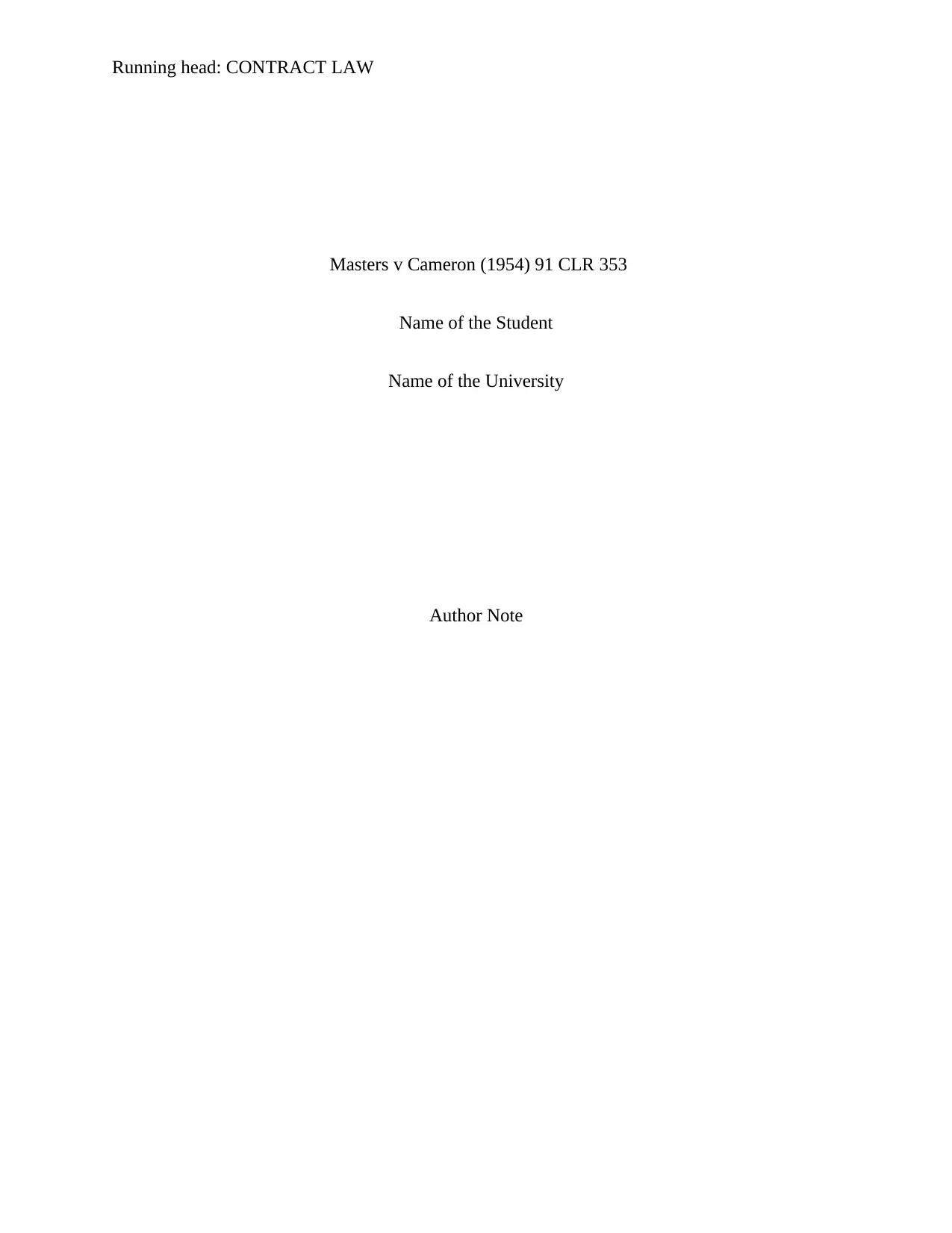
Running head: CONTRACT LAW
Masters v Cameron (1954) 91 CLR 353
Name of the Student
Name of the University
Author Note
Masters v Cameron (1954) 91 CLR 353
Name of the Student
Name of the University
Author Note
Paraphrase This Document
Need a fresh take? Get an instant paraphrase of this document with our AI Paraphraser
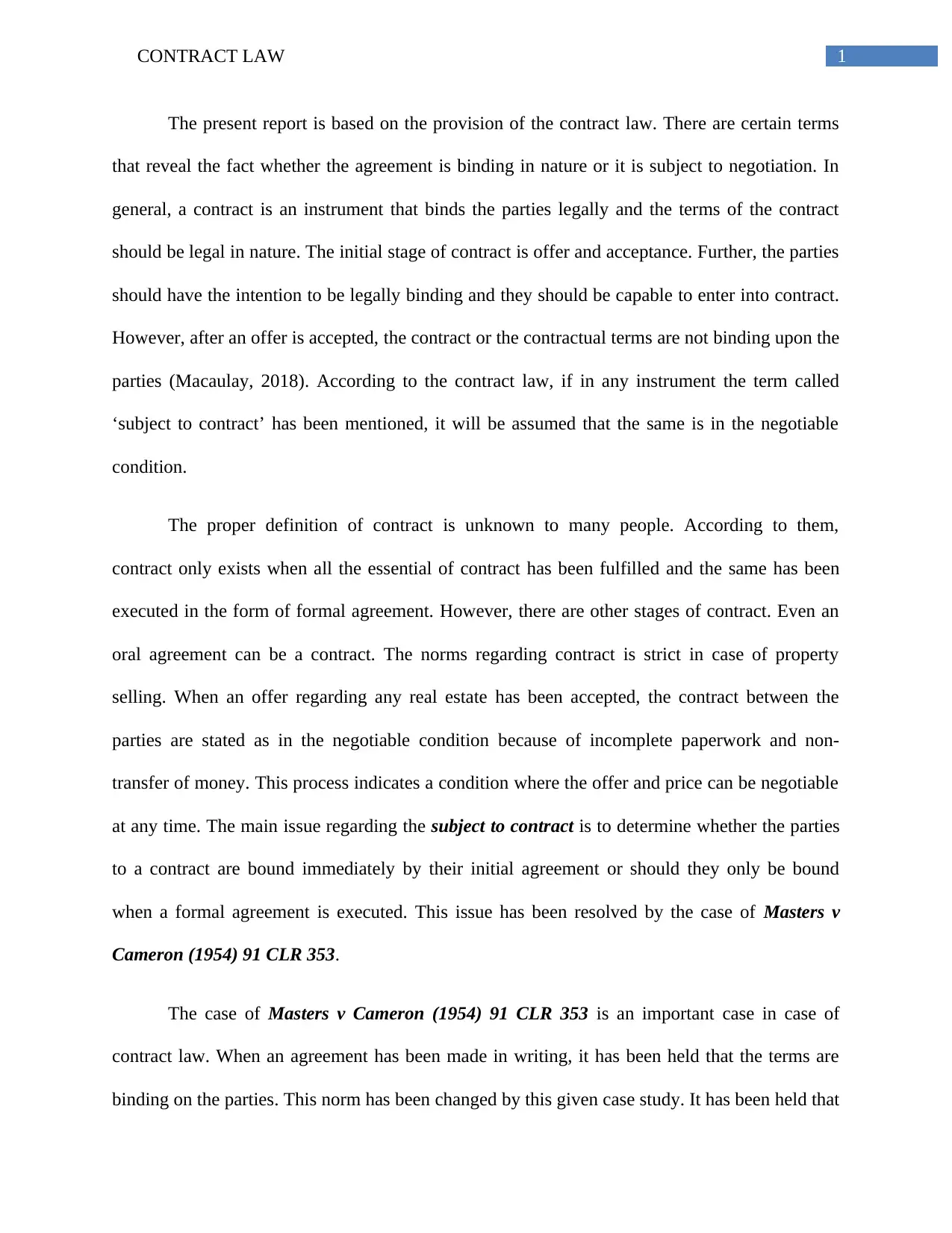
1CONTRACT LAW
The present report is based on the provision of the contract law. There are certain terms
that reveal the fact whether the agreement is binding in nature or it is subject to negotiation. In
general, a contract is an instrument that binds the parties legally and the terms of the contract
should be legal in nature. The initial stage of contract is offer and acceptance. Further, the parties
should have the intention to be legally binding and they should be capable to enter into contract.
However, after an offer is accepted, the contract or the contractual terms are not binding upon the
parties (Macaulay, 2018). According to the contract law, if in any instrument the term called
‘subject to contract’ has been mentioned, it will be assumed that the same is in the negotiable
condition.
The proper definition of contract is unknown to many people. According to them,
contract only exists when all the essential of contract has been fulfilled and the same has been
executed in the form of formal agreement. However, there are other stages of contract. Even an
oral agreement can be a contract. The norms regarding contract is strict in case of property
selling. When an offer regarding any real estate has been accepted, the contract between the
parties are stated as in the negotiable condition because of incomplete paperwork and non-
transfer of money. This process indicates a condition where the offer and price can be negotiable
at any time. The main issue regarding the subject to contract is to determine whether the parties
to a contract are bound immediately by their initial agreement or should they only be bound
when a formal agreement is executed. This issue has been resolved by the case of Masters v
Cameron (1954) 91 CLR 353.
The case of Masters v Cameron (1954) 91 CLR 353 is an important case in case of
contract law. When an agreement has been made in writing, it has been held that the terms are
binding on the parties. This norm has been changed by this given case study. It has been held that
The present report is based on the provision of the contract law. There are certain terms
that reveal the fact whether the agreement is binding in nature or it is subject to negotiation. In
general, a contract is an instrument that binds the parties legally and the terms of the contract
should be legal in nature. The initial stage of contract is offer and acceptance. Further, the parties
should have the intention to be legally binding and they should be capable to enter into contract.
However, after an offer is accepted, the contract or the contractual terms are not binding upon the
parties (Macaulay, 2018). According to the contract law, if in any instrument the term called
‘subject to contract’ has been mentioned, it will be assumed that the same is in the negotiable
condition.
The proper definition of contract is unknown to many people. According to them,
contract only exists when all the essential of contract has been fulfilled and the same has been
executed in the form of formal agreement. However, there are other stages of contract. Even an
oral agreement can be a contract. The norms regarding contract is strict in case of property
selling. When an offer regarding any real estate has been accepted, the contract between the
parties are stated as in the negotiable condition because of incomplete paperwork and non-
transfer of money. This process indicates a condition where the offer and price can be negotiable
at any time. The main issue regarding the subject to contract is to determine whether the parties
to a contract are bound immediately by their initial agreement or should they only be bound
when a formal agreement is executed. This issue has been resolved by the case of Masters v
Cameron (1954) 91 CLR 353.
The case of Masters v Cameron (1954) 91 CLR 353 is an important case in case of
contract law. When an agreement has been made in writing, it has been held that the terms are
binding on the parties. This norm has been changed by this given case study. It has been held that
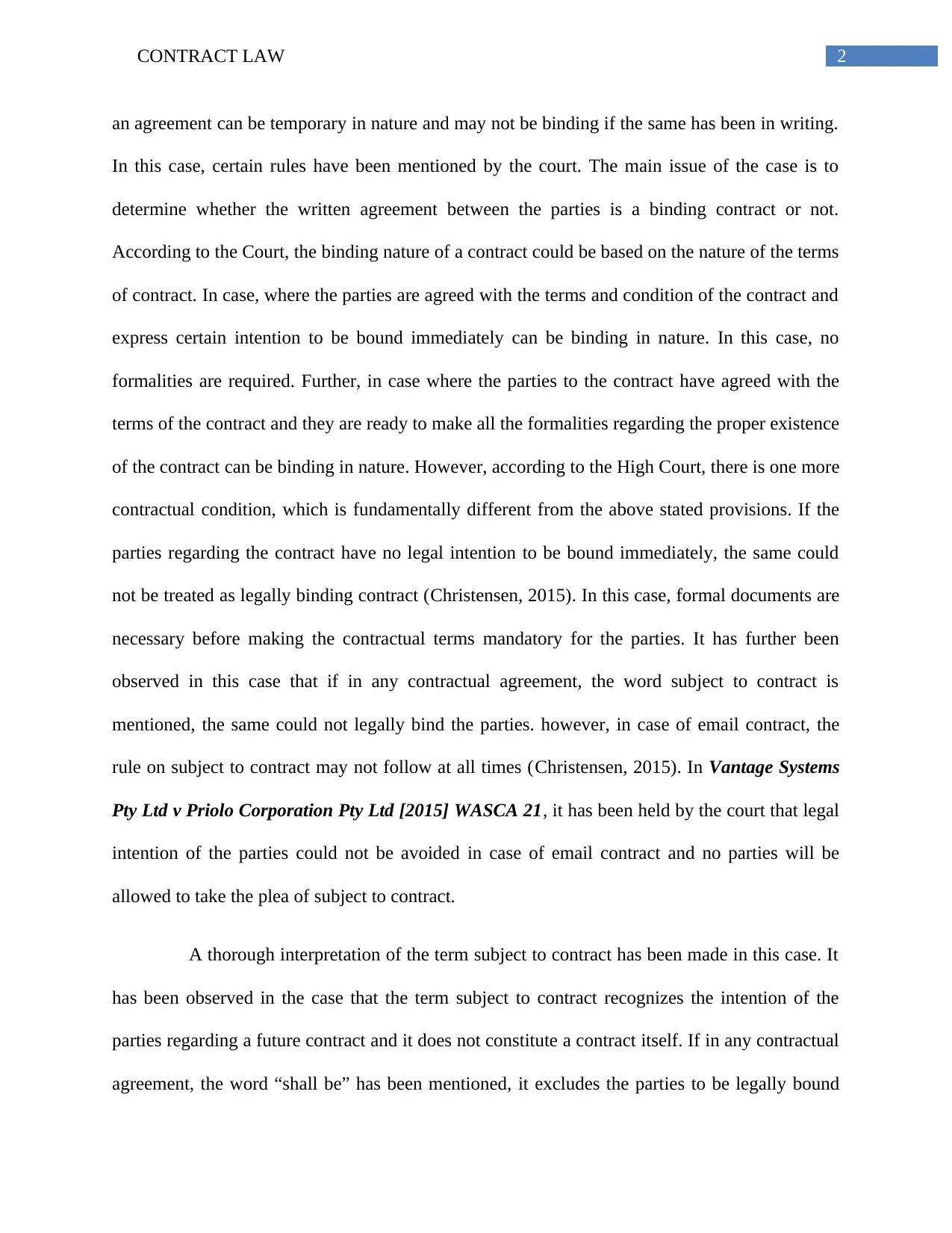
2CONTRACT LAW
an agreement can be temporary in nature and may not be binding if the same has been in writing.
In this case, certain rules have been mentioned by the court. The main issue of the case is to
determine whether the written agreement between the parties is a binding contract or not.
According to the Court, the binding nature of a contract could be based on the nature of the terms
of contract. In case, where the parties are agreed with the terms and condition of the contract and
express certain intention to be bound immediately can be binding in nature. In this case, no
formalities are required. Further, in case where the parties to the contract have agreed with the
terms of the contract and they are ready to make all the formalities regarding the proper existence
of the contract can be binding in nature. However, according to the High Court, there is one more
contractual condition, which is fundamentally different from the above stated provisions. If the
parties regarding the contract have no legal intention to be bound immediately, the same could
not be treated as legally binding contract (Christensen, 2015). In this case, formal documents are
necessary before making the contractual terms mandatory for the parties. It has further been
observed in this case that if in any contractual agreement, the word subject to contract is
mentioned, the same could not legally bind the parties. however, in case of email contract, the
rule on subject to contract may not follow at all times (Christensen, 2015). In Vantage Systems
Pty Ltd v Priolo Corporation Pty Ltd [2015] WASCA 21, it has been held by the court that legal
intention of the parties could not be avoided in case of email contract and no parties will be
allowed to take the plea of subject to contract.
A thorough interpretation of the term subject to contract has been made in this case. It
has been observed in the case that the term subject to contract recognizes the intention of the
parties regarding a future contract and it does not constitute a contract itself. If in any contractual
agreement, the word “shall be” has been mentioned, it excludes the parties to be legally bound
an agreement can be temporary in nature and may not be binding if the same has been in writing.
In this case, certain rules have been mentioned by the court. The main issue of the case is to
determine whether the written agreement between the parties is a binding contract or not.
According to the Court, the binding nature of a contract could be based on the nature of the terms
of contract. In case, where the parties are agreed with the terms and condition of the contract and
express certain intention to be bound immediately can be binding in nature. In this case, no
formalities are required. Further, in case where the parties to the contract have agreed with the
terms of the contract and they are ready to make all the formalities regarding the proper existence
of the contract can be binding in nature. However, according to the High Court, there is one more
contractual condition, which is fundamentally different from the above stated provisions. If the
parties regarding the contract have no legal intention to be bound immediately, the same could
not be treated as legally binding contract (Christensen, 2015). In this case, formal documents are
necessary before making the contractual terms mandatory for the parties. It has further been
observed in this case that if in any contractual agreement, the word subject to contract is
mentioned, the same could not legally bind the parties. however, in case of email contract, the
rule on subject to contract may not follow at all times (Christensen, 2015). In Vantage Systems
Pty Ltd v Priolo Corporation Pty Ltd [2015] WASCA 21, it has been held by the court that legal
intention of the parties could not be avoided in case of email contract and no parties will be
allowed to take the plea of subject to contract.
A thorough interpretation of the term subject to contract has been made in this case. It
has been observed in the case that the term subject to contract recognizes the intention of the
parties regarding a future contract and it does not constitute a contract itself. If in any contractual
agreement, the word “shall be” has been mentioned, it excludes the parties to be legally bound
⊘ This is a preview!⊘
Do you want full access?
Subscribe today to unlock all pages.

Trusted by 1+ million students worldwide
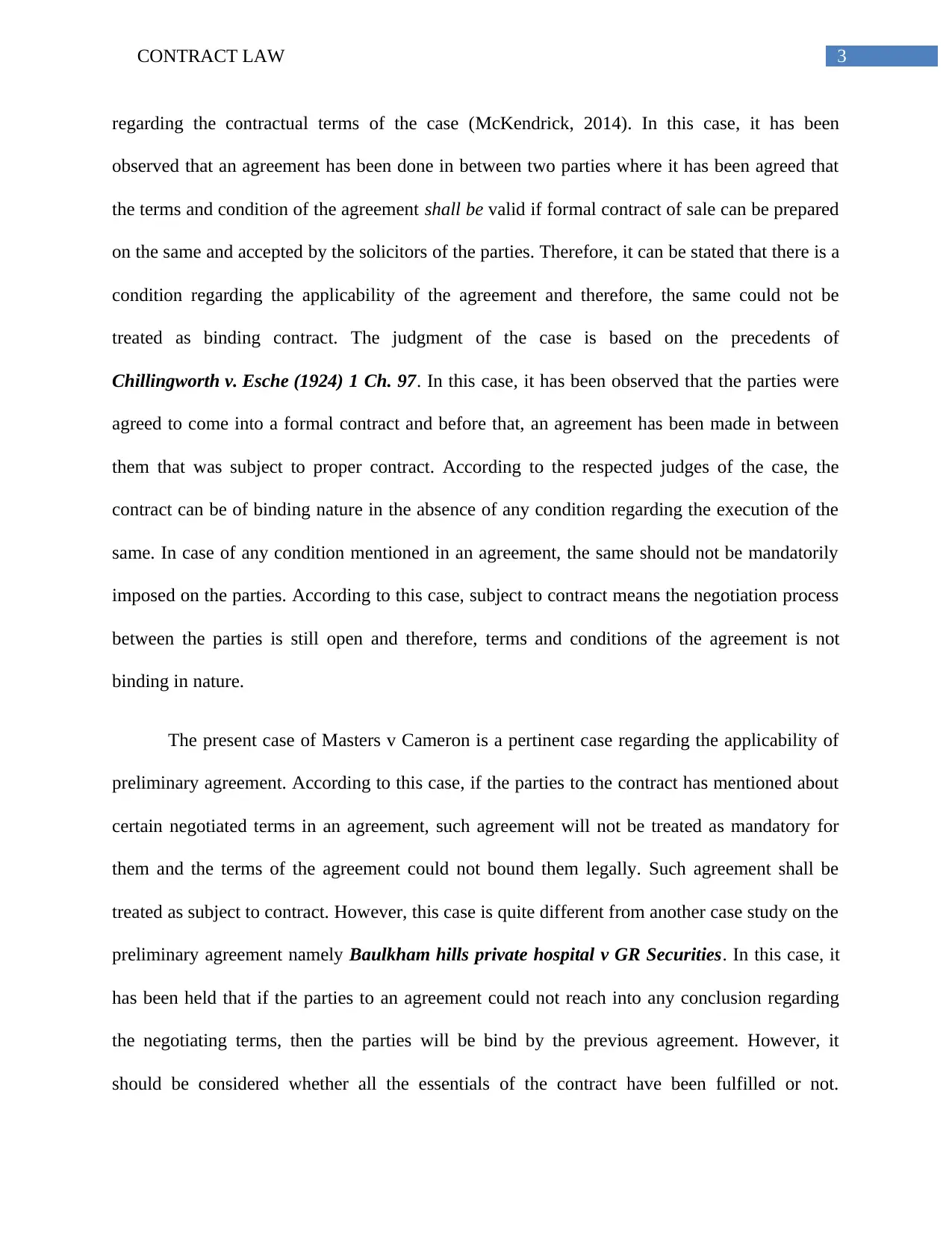
3CONTRACT LAW
regarding the contractual terms of the case (McKendrick, 2014). In this case, it has been
observed that an agreement has been done in between two parties where it has been agreed that
the terms and condition of the agreement shall be valid if formal contract of sale can be prepared
on the same and accepted by the solicitors of the parties. Therefore, it can be stated that there is a
condition regarding the applicability of the agreement and therefore, the same could not be
treated as binding contract. The judgment of the case is based on the precedents of
Chillingworth v. Esche (1924) 1 Ch. 97. In this case, it has been observed that the parties were
agreed to come into a formal contract and before that, an agreement has been made in between
them that was subject to proper contract. According to the respected judges of the case, the
contract can be of binding nature in the absence of any condition regarding the execution of the
same. In case of any condition mentioned in an agreement, the same should not be mandatorily
imposed on the parties. According to this case, subject to contract means the negotiation process
between the parties is still open and therefore, terms and conditions of the agreement is not
binding in nature.
The present case of Masters v Cameron is a pertinent case regarding the applicability of
preliminary agreement. According to this case, if the parties to the contract has mentioned about
certain negotiated terms in an agreement, such agreement will not be treated as mandatory for
them and the terms of the agreement could not bound them legally. Such agreement shall be
treated as subject to contract. However, this case is quite different from another case study on the
preliminary agreement namely Baulkham hills private hospital v GR Securities. In this case, it
has been held that if the parties to an agreement could not reach into any conclusion regarding
the negotiating terms, then the parties will be bind by the previous agreement. However, it
should be considered whether all the essentials of the contract have been fulfilled or not.
regarding the contractual terms of the case (McKendrick, 2014). In this case, it has been
observed that an agreement has been done in between two parties where it has been agreed that
the terms and condition of the agreement shall be valid if formal contract of sale can be prepared
on the same and accepted by the solicitors of the parties. Therefore, it can be stated that there is a
condition regarding the applicability of the agreement and therefore, the same could not be
treated as binding contract. The judgment of the case is based on the precedents of
Chillingworth v. Esche (1924) 1 Ch. 97. In this case, it has been observed that the parties were
agreed to come into a formal contract and before that, an agreement has been made in between
them that was subject to proper contract. According to the respected judges of the case, the
contract can be of binding nature in the absence of any condition regarding the execution of the
same. In case of any condition mentioned in an agreement, the same should not be mandatorily
imposed on the parties. According to this case, subject to contract means the negotiation process
between the parties is still open and therefore, terms and conditions of the agreement is not
binding in nature.
The present case of Masters v Cameron is a pertinent case regarding the applicability of
preliminary agreement. According to this case, if the parties to the contract has mentioned about
certain negotiated terms in an agreement, such agreement will not be treated as mandatory for
them and the terms of the agreement could not bound them legally. Such agreement shall be
treated as subject to contract. However, this case is quite different from another case study on the
preliminary agreement namely Baulkham hills private hospital v GR Securities. In this case, it
has been held that if the parties to an agreement could not reach into any conclusion regarding
the negotiating terms, then the parties will be bind by the previous agreement. However, it
should be considered whether all the essentials of the contract have been fulfilled or not.
Paraphrase This Document
Need a fresh take? Get an instant paraphrase of this document with our AI Paraphraser
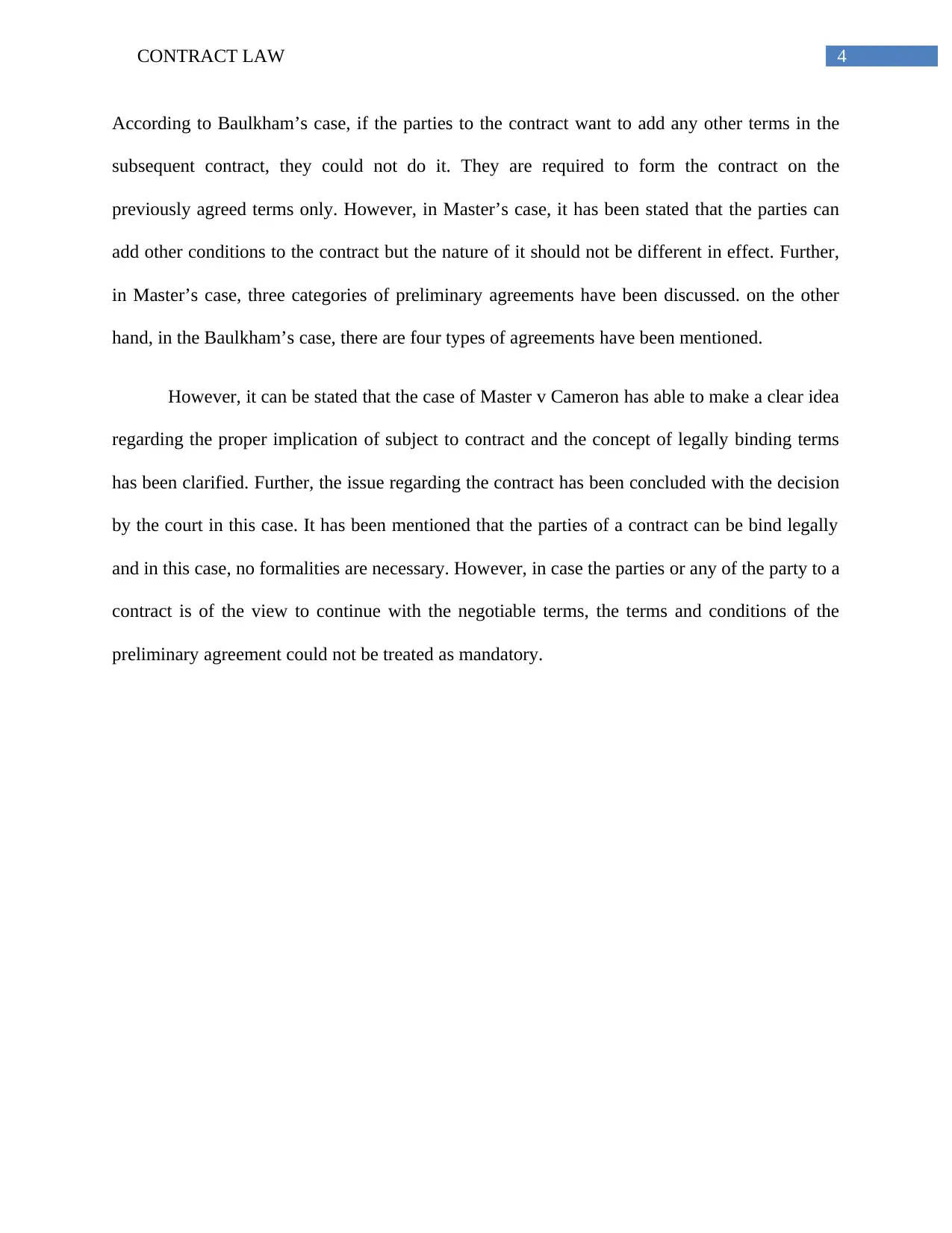
4CONTRACT LAW
According to Baulkham’s case, if the parties to the contract want to add any other terms in the
subsequent contract, they could not do it. They are required to form the contract on the
previously agreed terms only. However, in Master’s case, it has been stated that the parties can
add other conditions to the contract but the nature of it should not be different in effect. Further,
in Master’s case, three categories of preliminary agreements have been discussed. on the other
hand, in the Baulkham’s case, there are four types of agreements have been mentioned.
However, it can be stated that the case of Master v Cameron has able to make a clear idea
regarding the proper implication of subject to contract and the concept of legally binding terms
has been clarified. Further, the issue regarding the contract has been concluded with the decision
by the court in this case. It has been mentioned that the parties of a contract can be bind legally
and in this case, no formalities are necessary. However, in case the parties or any of the party to a
contract is of the view to continue with the negotiable terms, the terms and conditions of the
preliminary agreement could not be treated as mandatory.
According to Baulkham’s case, if the parties to the contract want to add any other terms in the
subsequent contract, they could not do it. They are required to form the contract on the
previously agreed terms only. However, in Master’s case, it has been stated that the parties can
add other conditions to the contract but the nature of it should not be different in effect. Further,
in Master’s case, three categories of preliminary agreements have been discussed. on the other
hand, in the Baulkham’s case, there are four types of agreements have been mentioned.
However, it can be stated that the case of Master v Cameron has able to make a clear idea
regarding the proper implication of subject to contract and the concept of legally binding terms
has been clarified. Further, the issue regarding the contract has been concluded with the decision
by the court in this case. It has been mentioned that the parties of a contract can be bind legally
and in this case, no formalities are necessary. However, in case the parties or any of the party to a
contract is of the view to continue with the negotiable terms, the terms and conditions of the
preliminary agreement could not be treated as mandatory.
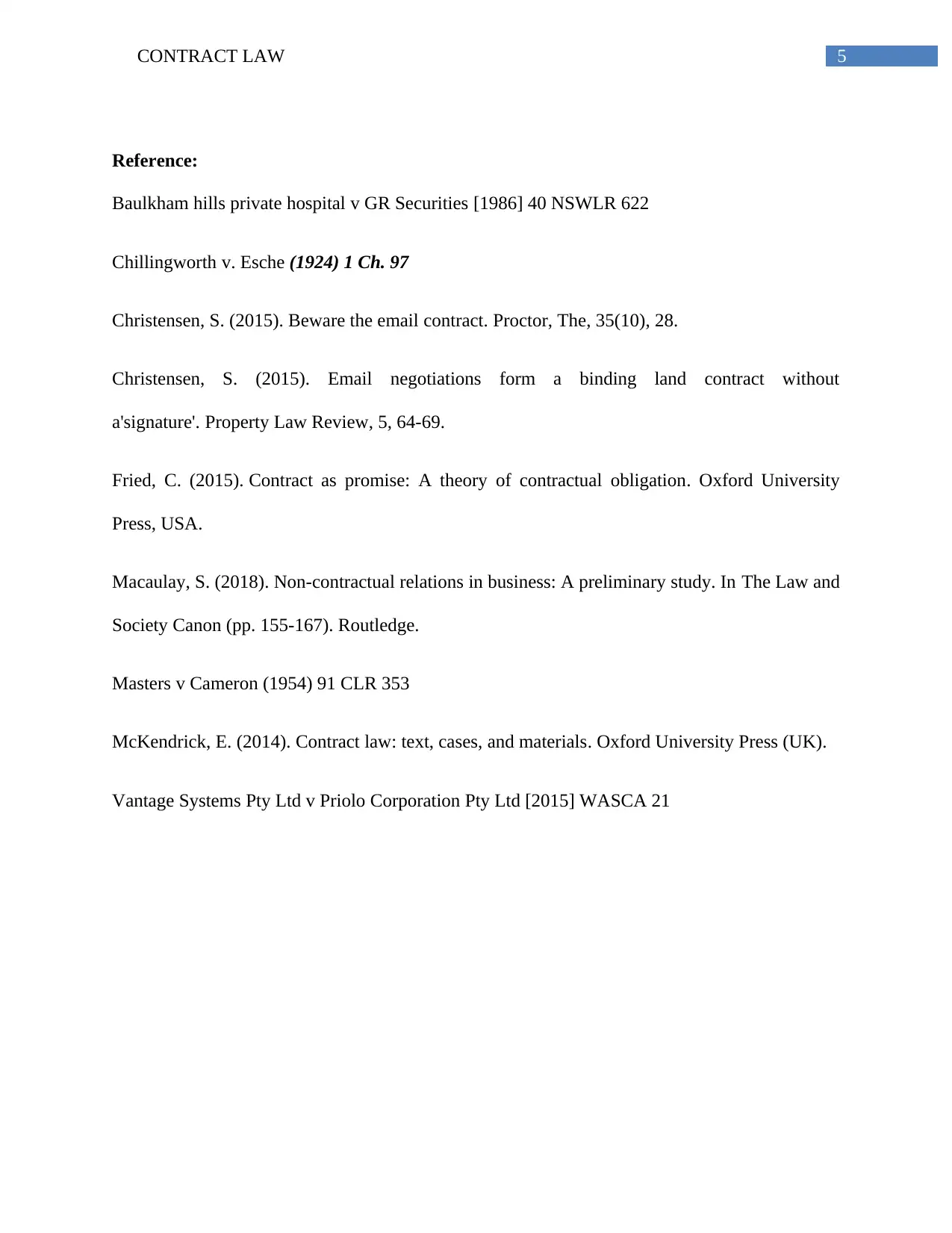
5CONTRACT LAW
Reference:
Baulkham hills private hospital v GR Securities [1986] 40 NSWLR 622
Chillingworth v. Esche (1924) 1 Ch. 97
Christensen, S. (2015). Beware the email contract. Proctor, The, 35(10), 28.
Christensen, S. (2015). Email negotiations form a binding land contract without
a'signature'. Property Law Review, 5, 64-69.
Fried, C. (2015). Contract as promise: A theory of contractual obligation. Oxford University
Press, USA.
Macaulay, S. (2018). Non-contractual relations in business: A preliminary study. In The Law and
Society Canon (pp. 155-167). Routledge.
Masters v Cameron (1954) 91 CLR 353
McKendrick, E. (2014). Contract law: text, cases, and materials. Oxford University Press (UK).
Vantage Systems Pty Ltd v Priolo Corporation Pty Ltd [2015] WASCA 21
Reference:
Baulkham hills private hospital v GR Securities [1986] 40 NSWLR 622
Chillingworth v. Esche (1924) 1 Ch. 97
Christensen, S. (2015). Beware the email contract. Proctor, The, 35(10), 28.
Christensen, S. (2015). Email negotiations form a binding land contract without
a'signature'. Property Law Review, 5, 64-69.
Fried, C. (2015). Contract as promise: A theory of contractual obligation. Oxford University
Press, USA.
Macaulay, S. (2018). Non-contractual relations in business: A preliminary study. In The Law and
Society Canon (pp. 155-167). Routledge.
Masters v Cameron (1954) 91 CLR 353
McKendrick, E. (2014). Contract law: text, cases, and materials. Oxford University Press (UK).
Vantage Systems Pty Ltd v Priolo Corporation Pty Ltd [2015] WASCA 21
⊘ This is a preview!⊘
Do you want full access?
Subscribe today to unlock all pages.

Trusted by 1+ million students worldwide
1 out of 6
Related Documents
Your All-in-One AI-Powered Toolkit for Academic Success.
+13062052269
info@desklib.com
Available 24*7 on WhatsApp / Email
![[object Object]](/_next/static/media/star-bottom.7253800d.svg)
Unlock your academic potential
Copyright © 2020–2026 A2Z Services. All Rights Reserved. Developed and managed by ZUCOL.





